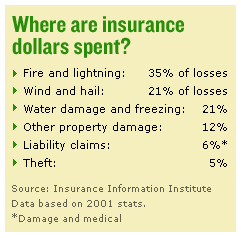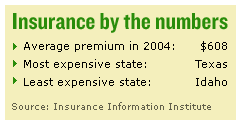BEND, Ore. (CNN/Money) – Even if you live thousands of miles from the Atlantic, hurricane season underscores the importance of making sure your homeowners insurance is up to speed.

Nationally, the cost of rebuilding a home is anywhere from 6 percent to 8 percent higher than a year ago, according to David Bauer, chairman of the Independent Insurance Agents and Brokers of New York. "Lumber, steel, labor and cement are all more expensive," he said.
At the same time, homeowners have taken advantage of low interest rates to make additions and pay for renovations, added Jeanne Salvatore of the Insurance Information Institute. Unless you let your insurance company know about home improvements, they likely won't be covered.
"It's really your responsibility to re-evaluate your insurance at least once a year when you get your bill or if you go through any life changes, such as marriage, or make alterations to your home," she said.
Here's how to make sure your policy doesn't come up short.
First and foremost, the house
Homeowners insurance begins with insuring the structure itself.
Most policies are based on replacement cost – what it would cost to rebuild your house from the ground up. As noted, this value can change, depending on the cost of labor and materials.
"Most carriers increase the replacement cost of dwelling annually based on guidelines," said Bauer. "In some parts of the country that increase may only be 2 percent, while in others it may be as high as 9 percent."

Of course, you shouldn't assume that your policy has been updated to reflect these higher costs. Ask your insurance company to estimate replacement costs based on your home's size, location and materials. Moreover, make sure this estimate includes any and all improvements or additions.
If you live in an old home, remember that a standard policy will replace losses with today's construction materials. That means your cherished plaster walls become sheetrock. Hand-carved moldings? Welcome to Home Depot.
There are special policies that will pay to try to restore such details, noted Salvatore, but they carry a higher premium. Similarly, a standard policy may not cover the cost of building a property using updated building codes. To avoid footing the bill yourself, you may need to add an "ordinance" or "law" supplement to your policy.
Here's something else to consider when assessing your insurance: Standard policies do not insure your house against all natural disasters.
Damage related to floods, earthquakes and, increasingly, mold are not covered. Depending on where you live, you'll want to look into a specific policy to insure against any of these hazards. Flood insurance is available through the Federal Insurance Administration, while earthquake coverage is issued by private insurers, and in California by the state's Earthquake Authority.
Insurance for all your stuff
Most policies insure the contents of a house, typically for 50 percent to 70 percent of the amount of insurance on the house itself. Again, a standard policy may not be enough. Most policies have dollar limits on such things as jewelry, art, silverware, computers or sporting equipment. Weigh the costs and benefits of buying additional coverage, which is referred to as a floater or an endorsement.
Many policies give owners a choice between insuring possessions for their actual cash value or their replacement value. If an old television is stolen, for example, a cash value policy will give you what that television is really worth – not much – while a replacement policy will pay for a new one. Premiums for replacement-value policies are typically 10 percent more, said Salvatore, but that's usually money well spent.
When reviewing your policy, account for any additions to your household – such as kids moving back home – or your art or jewelry collection. If you haven't already, make an inventory of your valuables, and photograph or videotape the rooms in your house.
Protection from lawsuits
Liability protection is a key benefit for homeowners insurance that is often overlooked. If, say, your dog bites a dinner guest, your policy may pay for medical expenses, damages and legal costs.

Standard policies cover $100,000 of liability claims, according to the Insurance Information Institute, but many homeowners will want several times that amount, depending on their net worth. It's worth looking over your liability limits annually. If your net worth is higher than it was a year ago or your dog is more irritable, consider bumping up that limit.
Depending on your line of work, you might consider adding an umbrella policy. These policies offer a higher dollar amount of insurance and broader coverage, including libel, slander and invasion of privacy, which are not covered under standard policies.

|